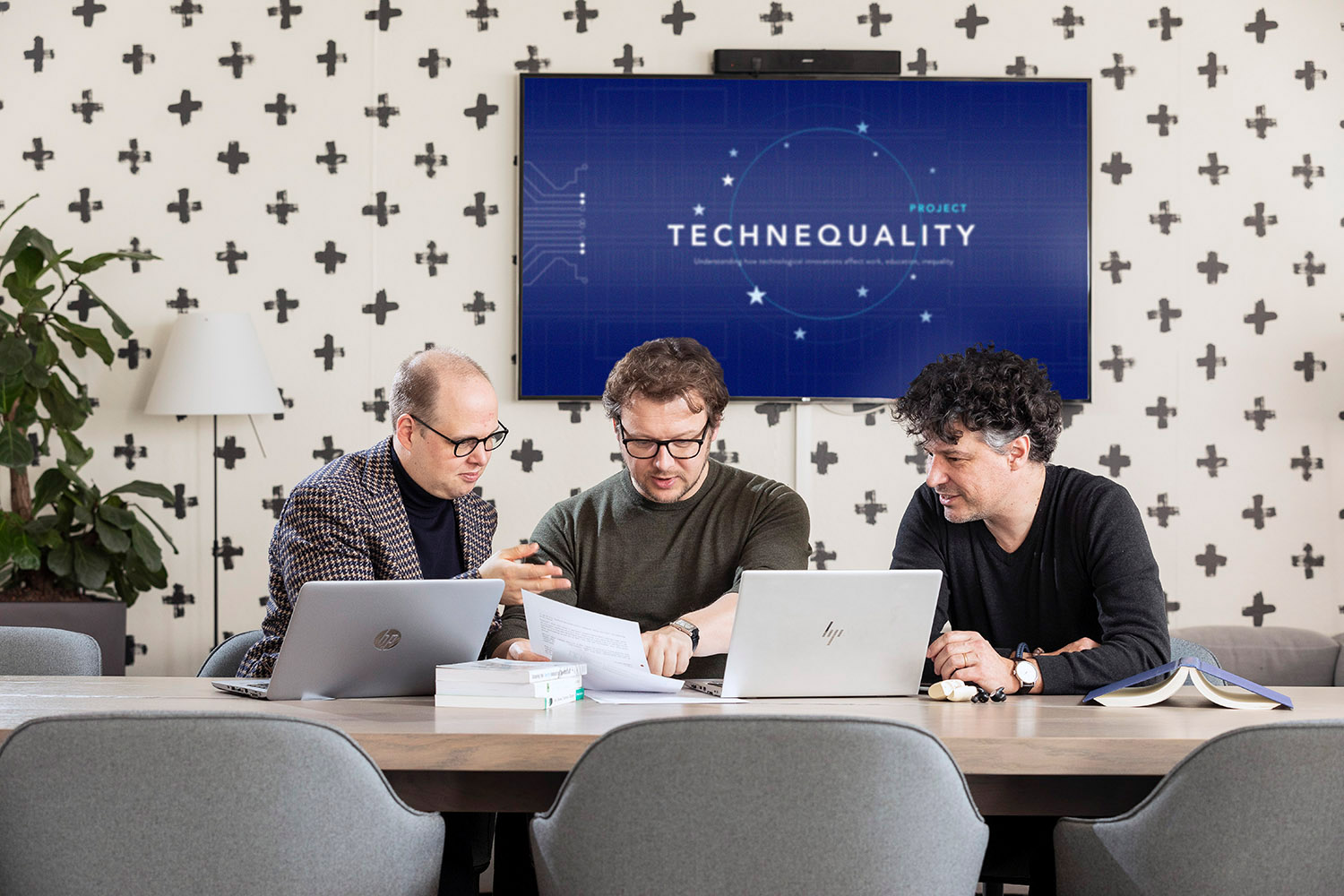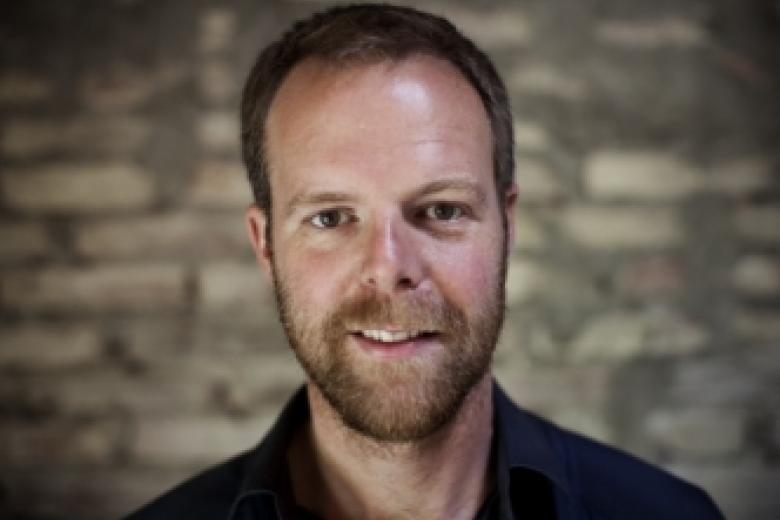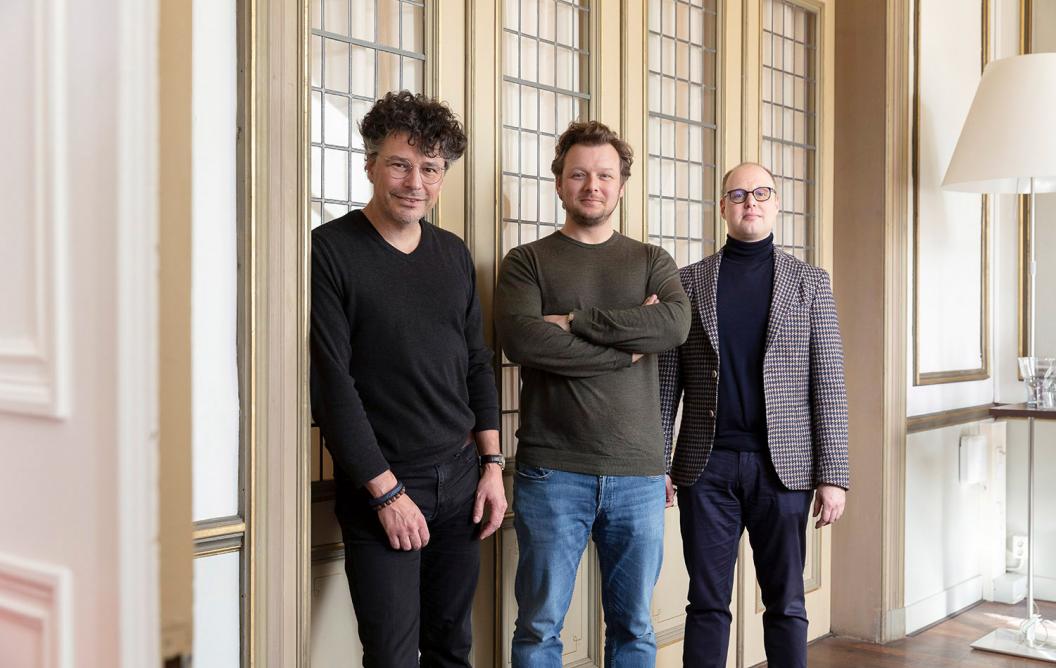An algorithm could do this better and on less coffee
What will I do once an algorithm can write mildly amusing articles about highly relevant research like this? Can I be retrained as a quantum logician? UM’s Mark Levels set up TECHNEQUALITY, a consortium of leading scholars around Europe. Their mission: to find out how AI and robotisation will affect the labour market and what policies are best suited to cushioning the blow – and hopefully tide me over to retirement.
How will robotics, AI and big data shape European societies? Who will be affected, and how? And what can governments do to alleviate the resulting increase in inequality? Ever since he started studying skills mismatches in the labour market, Mark Levels has had a niggling feeling that people, including policy makers, might not know enough about the current wave of automation fuelled by technological innovation.
There are two schools of thought on the development of AI. “Some think it’s the same as every other development like the industrial revolution: jobs will be lost, jobs will be created, there will be a period of sharp inequality but in the end everyone will be richer.” Some scholars, however, think that AI is fundamentally different – that it could be profoundly transformative for the way our society works.
The autonomous hammer of the middle classes
“If you invent a hammer, a carpenter can work much more efficiently, so you need fewer people to do the work – but AI is potentially a hammer that no longer needs a carpenter.” Levels gives call centres as an example: “Some chatbots can already answer around 80% of inbound questions – and 100% isn’t even necessary; they can answer all the routine questions and that makes most of the employees redundant.”
The potential consequences? “This may broadly affect the service sector: barristers, accountants and physicians. With routine cognitive tasks automated, the middle classes might be affected heavily. In many large companies, people are already training the algorithms that are to replace them – sometimes without knowing it.”
The somewhat bizarre logical endpoint of this would be a car company consisting of a CEO with an eight-figure salary and factory hall full of robots and algorithms – which begs the question of who will buy the cars… “That extreme scenario would definitely disrupt the economy. If fewer people get salaries, purchasing power will go down rapidly, resulting in prices but also state revenues going down.”

Can the system cope with large-scale unemployment?
Marxistly enough, the big winners are the ones owning the means of production: “Players like Amazon and Google develop customisable AI which companies can implement – and they have the big data sets necessary to train the algorithms. Another important factor is computing capacity, so the companies developing the hardware like processors and servers.”
The people left most vulnerable by this transition will be the ones who struggle to acquire new skills. That’s not necessarily a question of social class but also of things like age, cognitive ability, the psychological impact of going from highly respected expert to novice…” Levels is understandably sceptical about the notion that we can retrain truck drivers as quantum computing engineers.
How vulnerable are we?
“If it hinges on mathematical skills, we have a problem.” Levels quotes data that indicate one-third of the adult Dutch pollution lack the basic maths skills to follow further education in this field. “Maybe investing in STEM education isn’t the most sustainable solution anyway… Maybe we should focus on social and emotional skills and understanding the human condition – things AI won’t be able to do in the foreseeable future.”
Levels does not have to look far for inspiration. “The mining district in South Limburg was among the wealthiest areas in the Netherlands. They closed the mines and replaced it with employers in the knowledge economy.” Hence, Maastricht University – and thank goodness for that! “But it’s not former miners who work here – a lot of these communities still struggle badly.”
“We can’t just wait and see”
AI might herald a more fundamental change. “The extreme scenario is that 47% of jobs will disappear – other predictions say it will be as little as 8%, which is still a massive shift.” All of this is just speculation and forecasting but Levels argues that “we can’t just wait and see - we have to be prepared for different scenarios. That’s why we try to gather data and infuse the debate with empirical data.”
“The basis is understanding the potential impact on the labour market.” UM’s Didier Fouarge and Cambridge Econometrics are developing a dashboard for the European labour market forecasting model that allows for various scenarios of automation in the context of existing demographic and economic trends. It enables TECHNEQUALITY to fine-tune simulations according to different parameters in different countries – and make them available to policy makers.
“Our partners in Tilburg are conducting experiments with participatory income – a variation on the much-discussed universal basic income that demands people contribute to civic society in some way.” Researchers in Berlin are investigating how educational systems could respond, e.g. if lifelong learning should become the new standard.
Well-informed debate
“We have conducted surveys of employers to determine automation risks of certain types of jobs, depending on country and institutional context.” In a related project, TECHNEQUALITY researchers also study large companies in Germany to assess the actual impact of automation as it happens. “We also talk to policy-makers, government officials and union leaders to think about appropriate policy responses.”
Levels’ take on it so far is encouraging: “I’m not worried. My experience from talking to policy-makers is that they are willing to talk about it and mostly ask the right questions. The way current technological developments will impact society depends on government, first and foremost. I think, however this plays out, it will be manageable so long as we keep having a well-informed debate.”
The UM-led consortium TECHNEQUALITY, set up by Levels and Montizaan, brings together a multidisciplinary group of experts from prestigious HEI’s around Europe to work with policy-makers to address AI and robotisation’s impact on the labour market. The research is funded by the European Union’s Horizon 2020 programme. Eight institutions are involved:
- Maastricht University
- University of Oxford
- Cambridge Econometrics
- WZB Berlin Social Science Centre
- Tallinn University
- Tilburg University
- Stockholm University
- European University Institute
Also read
-
Christian Ernsten awarded funding for project on recurating colonial-era collections
UnRest focuses on the historically significant yet deeply contested archives and artworks associated with Robert Jacob Gordon (1743–1795) – a Dutch military officer and explorer whose documentation of the Cape region shaped European knowledge of South Africa during the 18th century
-
Milou: “Studying is still often a privilege’’
Even outside the lecture hall, law student Milou Scholten is committed to justice. As the chair of Students for Equality, she campaigns for accessible education and equal opportunities for all students.
-
Tanne van de Kreeke – a former lawyer turned epidemiologist
According to Tanne, a former lawyer and now part-time Epidemiology student, the quality of research in general would improve if more people had a better understanding of epidemiology and how the field relates to research methodology. Tanne is clear about the benefits of the master’s programme.
